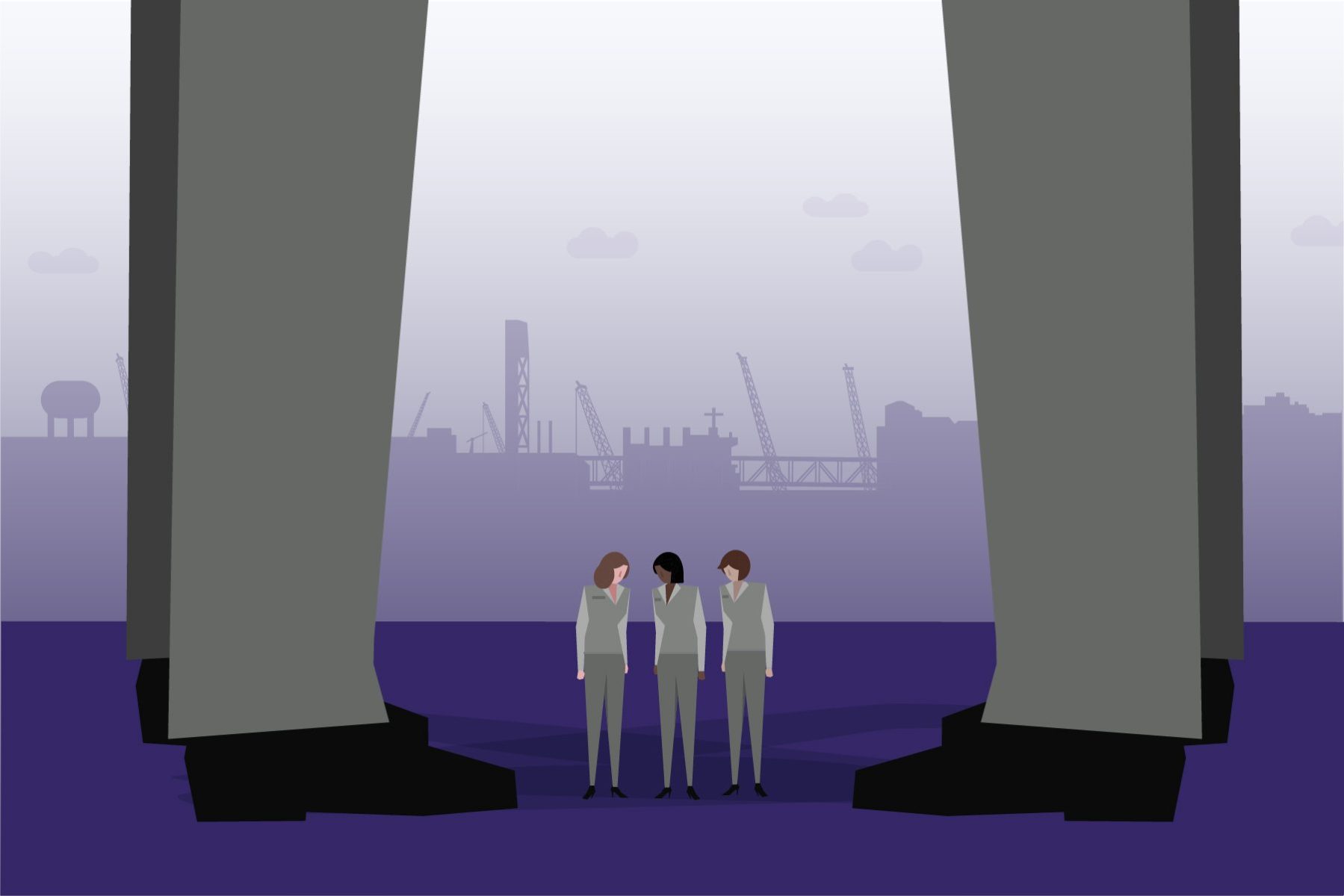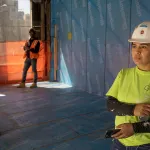Jamieka Canada started working at BAE Systems Norfolk Ship Repair, a shipyard in Virginia that updates and maintains Navy warships, in 2006. She began hearing offensive sexual comments directed at her mere months into her employment, establishing what would become a long-lasting toxic environment that wore her down throughout the years.
Co-workers said they could imagine her “without her work clothes on” and lied about compensating her in exchange for sexual acts. About a year later, around 2007, she said, her supervisor started directing offensive sexual comments toward her, including a comment about having lotion in his office and needing a massage.
The comments were not the only problem.
The shipyard told Canada when she was hired that she would get steady promotions, she said. Along with the potential for financial security, she was excited to grow in her trade at the shipyard’s pipe shop, where pipefitters install and maintain the ship’s piping systems.
Canada was hired as a third-class handyperson, which is the entry-level position at the shipyard. She was promoted to second-class handyperson in 2011, five years after she started, and then again to first-class handyperson in 2012. In August 2013, she was promoted to third-class mechanic — the shipyard’s entry level for skilled work — but hasn’t been able to move up since. And, she said, asking for a promotion sometimes led to unwanted comments like when she asked her shop’s overseer for a raise a year into work, and he said, according to legal documents, “let me bring you whatever you need for you and your kids.” She said that he was implying that he wanted a personal relationship with her.
Things came to a head in 2013 when she joined scores of women at BAE in filing a class-action lawsuit for workplace sexual harassment and gender discrimination. It includes accusations by Canada, who is listed in the lawsuit as Jamieka Brown, against a former supervisor who made sexually explicit comments.
BAE agreed to a $3 million settlement in 2016, split among 166 women who worked for the company between 2007 and 2014, and an additional $1.15 million for attorney fees and expenses. The settlement also stipulated that supervisors should base promotion decisions on work-related criteria, like practical tests, and barred supervisors from using subjective measurements to decide raises.
“While we deny the allegations in the complaint, we elected to settle the case and put it behind us,” said BAE Systems Norfolk spokesman Karl Johnson after the hearing in 2016.
But did it make a difference?
It’s now 2021, and women at BAE are back in touch with the law firm Friedman & Houlding, LLP, which represented their interests in the 2013 lawsuit. The women in this story have filed charges of discrimination with the Equal Employment Opportunity Commission (EEOC), and the law firm told The 19th that there may be another lawsuit.
A spokesperson for BAE Systems told The 19th that the company “takes very seriously all complaints regarding the treatment of individuals in the workplace,” and that they “are committed to a work environment where everyone is treated with fairness and respect.” They also made a note that when they did settle the 2016 class-action lawsuit, that “as part of that mutual settlement agreement, the company agreed to take several actions over a two-year period to further improve its workforce.”
The 2016 settlement’s consent decree, a court order that lays out an enforceable plan, lasted two years. Canada said almost nothing has changed: Men in the shipyard still make comments, and she still has a hard time getting promoted.
“When I first started, my 16-year-old was a couple of months,” said Canada. “I look at him and am like, ‘I’m still going through this stuff.'”
Now, she said, she also has to deal with the retaliation that comes with reporting workplace harm. She said her supervisors call her “troublemaker” and tell co-workers to stay away from her, isolating her in the workplace.
Retaliation, according to data released by the EEOC, is a reality for many who report or stand up to workplace harassment or unequal treatment. In 2020, 37,632 people filed retaliation charges with the EEOC, making up 55.5% — over half — of all charges filed with the EEOC that year.
Lauren Sugerman, director at the nonprofit Chicago Women in Trades, explained that there are many forms of retaliation. One potentially career-altering form of retaliation is hindering training, which can result in job and wage stagnation. She said that most construction workplaces train workers through an apprenticeship model, which requires hands-on experience from a supervisor. Sometimes, she said, a person who has reported harassment will be informally barred from this hands-on experience, which means they won’t learn the skill to the level needed for promotion.
People know that I’ve been a fighter, and I’ve had to fight since I’ve been there.
Kel Sharpe, a union shop steward for workers at BAE Systems Norfolk Ship Repair
Sugerman also explained that sometimes retaliation could result in physical harm on a worksite. She said that if a person has a physically rigorous job — like the work done to maintain warships in a shipyard — colleagues could create physically precarious situations and present them as accidents. Someone could shake a ladder that the person who reported an incident is climbing, she said, or ask them to do the most dangerous tasks. Sometimes, she said, retaliation takes on a more obscure form, and the person who reported harassment is excluded or called names, and sometimes they are the target for rumors.
“Even if your perpetrator is disciplined or let go or challenged in some way, and things get better at that job site, you may encounter that same perpetrator at another job site and have to start afresh,” said Sugerman.
When Canada was assigned to another supervisor, other employees and managerial staff continued to say offensive things to her, but she no longer had to work under her first supervisor who made sexually explicit comments. However, she said, BAE’s shipyard is divided into shops, and she still has to work with her first supervisor, who works in the same shop. He no longer supervises her, but remembering her experience working with him and being in his vicinity causes her distress. The 19th is not naming Canada’s former supervisor but made several attempts to reach him through various channels.
The anger and stress from the shipyard seeped into Canada’s mood outside of BAE, but she didn’t talk about work at home, hoping to shield her young children from her experiences. But, as her children got older, she started sharing more about her job. Two of her children are now in their 20’s, and she said they told her they would never work at BAE because of what she experienced.
Women new to the shipyard, who were hired years after the 2016 settlement, have their own stories of harassment and hostility. Veronica Vines, who started in June 2018, said that she, like Canada, had to endure suggestive comments regularly. One of her supervisors asked her what color underwear she wore and accused her of going out late at night with men. The environment wore her down until she dreaded going into work.
Then, in May 2019, Vines lost her mother and filed for three-day bereavement leave and two-day personal leave so she could work through the logistics of a funeral and take care of her four children amid a wave of grief. According to an EEOC charge of discrimination she filed in November 2019, supervisors “gave her an absence” even when she “followed protocol.” She told The 19th that a supervisor had to sign off on her temporary leave after she lost her mother but never did. Instead, he marked her as absent, which put her at risk of “a writeup,” which could eventually lead to termination. When she returned to work, she said she had to show him her mother’s obituary to prove her grief, and the issue was eventually resolved.
Kel Sharpe, who started working for BAE in 2011 and participated in the 2013 lawsuit, is now a union shop steward and a member of the grievance committee, a peer-elected union representative. She said she keeps hearing stories about how women are given menial tasks, denying them opportunities to develop skills for promotion.
“They won’t get a raise without knowing the trade,” said Sharpe. “So that stops them.”
Sharpe is an insulator and started as a second-class handyperson. She already had technical experience when she applied for a job at BAE. She enlisted in the Army in 1989, hoping to get welding training, and after her Army contract ended, she started working for staffing firms. Before BAE, she worked a contract job as an insulator.
Since starting at BAE, she has been promoted three times and is waiting on a fourth, she said. She has been through the union grievance process twice after supervisors denied promotion requests, and is now in the process of her third grievance process for a denied promotion.
“People know that I’ve been a fighter, and I’ve had to fight since I’ve been there,” said Sharpe. “I shouldn’t have to fight for what I deserve.”






